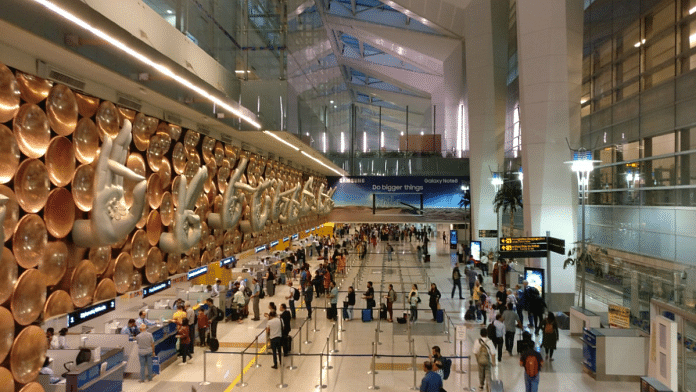New Delhi: Noting that there is a “serious imbalance” in favour of foreign carriers in terms of their number of “points of call” in India, a Parliamentary Standing Committee in its report Monday said the Ministry of Civil Aviation (MoCA) should work on obtaining Indian carriers “points of call” in more countries. The huge gap in favour of foreign airlines was owing to India’s past bilateral policy, it said.
Negotiated as part of bilateral air services agreement between countries, for a foreign airline, a ‘point of call’ airport is one where it can land or take off from, in a particular country.
Simply put, the imbalance that the report speaks about refers to foreign airlines having more ‘points of call’ in India than Indian airlines abroad.
The Parliamentary standing committee on transport, tourism and culture, chaired by V. Vijayasai Reddy, in a report titled ‘Development of Greenfield and Brownfield Airports and Issues pertaining to Civil Enclaves in Defence Airports’ also noted that it should be apprised of the steps being taken by the ministry to correct the “imbalance” and to “develop its major airports as a global transit hub for international flights”.
A global transit hub is an airport, outside of their domestic headquarters, from where foreign airlines conduct a chunk of their operations.
Highlighting that India currently does not have any airport that can compete with giant international transit hubs, like Dubai, Abu Dhabi, Doha, Singapore and Hong Kong, the panel had sought an explanation from the ministry for the country’s poor performance in this regard.
Acknowledging that the government has previously expressed intent to develop an airport in India that would serve as a global transit hub for international flights, the report said the key challenges to this, according to the ministry, include, existence of strong hubs in and around India, lack of wide-body aircraft with Indian carriers and slot constraints at major airports like Delhi and Mumbai.
“This has encouraged development of hubs in nearby countries like Singapore, Malaysia, UAE, Qatar, among other countries,” the ministry informed the panel.
While the committee in its report acknowledged “the various challenges being faced in establishing a global transit hub for international flights”, it observed that effective steps need to be taken to address the slot constraints at major airports, like Delhi and Mumbai. “Potential of airports close to Delhi and Mumbai like Jewar Airport and Navi Mumbai Airport may be explored for their development as a global transit hub,” it recommended.
When it comes to “points of call”, the committee in its report said, “It feels that the ministry should work on obtaining points of call for Indian carriers in more countries”.
The report added: “The ministry, in its written reply, informed that the erstwhile bilateral policy was very liberal in granting passenger traffic rights, and points of call in India for the airlines of nearby countries. This has resulted in a serious imbalance in the number of points of call in favour of foreign carriers.”
The Parliamentary committee report also pulled up the National Aviation Security Fee Trust (NASFT), under the Ministry of Civil Aviation (MoCA), for “failing to pay over Rs 4,700 crore” to Central Industrial Security Force (CISF) for airport security as of November 2022.
Also Read: Parliamentary panel greenlights bill on disciplinary powers for future theatre commanders
‘Pending CISF dues’
The Ministry of Civil Aviation set up NASFT in 2019, which is responsible to pay CISF for its deployment at airports. Before that, the airport management/Airport Authority of India (AAI) used to pay CISF directly. Since 1 July, 2019 CISF Cost of Deployment (COD) is centrally paid by NASFT for all airports.
“The committee notes that the total outstanding dues of COD for CISF from the NASFT is more than Rs 4,707 crore. Further, the 16 Joint Venture (JV) airports account for more than 64 percent of the total outstanding COD dues,” the report added.
The panel expressed concern over the huge pending dues to CISF by the NASFT, especially by the 16 joint venture airports and asked for the reasons behind this.
“The committee hopes that the dues will be cleared at the earliest by NASFT to enable the CISF to provide foolproof security at airports through deployment of enough manpower and the latest security gadgets at airports,” it added.
The report highlighted that CISF plays a pivotal role in providing security at airports, which is brought out by the fact that of the total of 353 units deployed by CISF across country for various other establishments, 66 or 18.7 percent are only deployed at the airports.
Expressing concerns about the pending dues, the panel noted that CISF provides security to a wide range of establishments across the country, and that the expected growth in the civil aviation sector will only increase the demand for manpower for airport security.
“The committee, therefore, recommends that the Ministry of Civil Aviation may examine the feasibility of setting up a specialised security agency for airports only, in consultation with the Ministry of Home Affairs,” it said.
(Edited by Richa Mishra)



